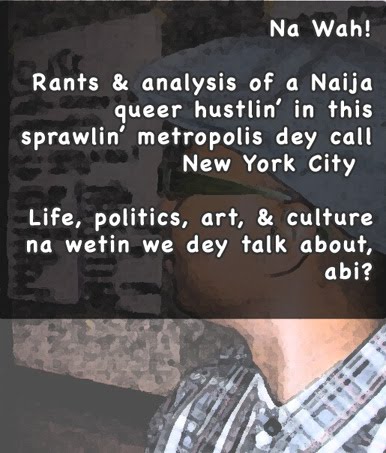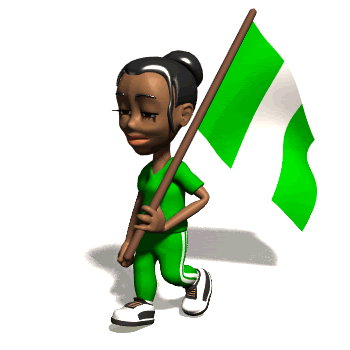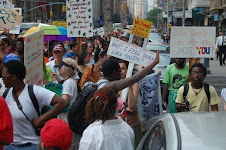
Her victory was so astonishing that all the whisperings about her gender were suddenly amplified. A few other runners who thought the title was rightfully theirs, grumbled publicly. The International Association of Athletics Federations (IAAF) stepped in, refusing to believe that someone so young, new and, some would argue, so black and poor, could win. They did the unimaginable: forced Semenya to undergo a battery of ‘gender tests’. Most female bodied people often dread that annual visit to the gynecologist. Many shudder at the thought of laying on the examination table, legs stirruped, and a medically trained individual studying away in between them. What Caster went through at the hands of supposed gender experts, psychologists, endocrinologists, gynecologists, and internal medicine specialists, makes the routine Pap smear exam look like a nice, peaceful stroll on a sandy shore.
As a Nigerian who defies gender categorization, Semenya’s story is all too familiar. I decided to interview other New York City Africans who, in some way or other, are gender ‘outlaws’ like me. I wanted to learn about what aspects of Caster’s story they strongly identified with, their analysis of how Caster has been treated, and what the entire world can learn from this moment. I asked NCK, an African man who wanted to maintain anonymity, why there was such furor around Semenya’s gender expressions. “[It’s] not only how dare she put herself within the arena of woman, but how dare she come out of those trappings [of poverty] and run the race, cross the finish line, wear the[gold] medal and the South African flag.” He connects the athlete’s experiences to the legacy of colonialism in Africa, stating that this is the same way labels like “colored” and “indian” were used to impose and uphold apartheid in South Africa. Words are not meant to impose limitations, he explains, yet words and phrases like “masculine” or “hermaphrodite”, have been used by other athletes, IAAF officials, and mainstream journalists, to dehumanize Caster, in spite of her win.

Kagendo Murungi, a Kenyan woman who identifies as gender non-conforming as an act of resistance against society’s two gender system, argues that African women’s successes are constantly devalued because of pervasive racist and sexist stereotypes. “There is a long history of the most private aspects of our physical anatomies being paraded around the world for the pleasure of the European elite. The spectacle and outrage of the Hottentot Venus might be the best known example of this phenomenon,” she declares. Similarly, Fly Yvonne Etaghene, a self identified Nigerian-dyke-poet, argues, “If Caster can be someone who is not fitting into a socially prescribed gender role, then that means our genders demarcations are not real.”
IAAF officials demanded Caster essentially prove she is a ‘traditional’ woman. “Well, what is a traditional woman? What are traditional women’s bodies,” queries NCK. “They are trying to say that this is one body that we can exclude out of the corpus of bodies labeled as women, as opposed to examining the label of woman, and seeing that the experience is so much larger and this person has transcended all of it.” Transcending, in Caster’s case has involved being a natural born athlete, refusing to obey gender norms in terms of how to dress or act, training endlessly, and developing a muscular body that many, regardless of gender, vie for (Linda Hamilton’s muscular build in Terminator 2 was the only reason I went to the gym in the ‘90s). Masculine women are nothing new, so why are Caster and gender nonconforming people in general, demonized by mainstream society? Etaghene blames it on people’s inability to accept gender expressions falling outside the socially-prescribed two gender system enforced in practically every sphere of life. “People don’t know how to deal with athletic bodies unless they are attached to people who have penises. [They are] not able to deal with ways in which women can be and are masculine.”
Gender nonconformity, Etaghene argues, is a vital part of the tapestry of African experiences and expressions. “If you look at African cultures and others from the dawn of time, there have always been masculine women and feminine men, and people who have traversed the gender spectrum, whether it be in a spiritual ceremony and someone who is biologically a woman is possessed by a masculine spirit, and is acting in a way that is [perceived as] masculine. That is gender revolutionary.” The dark-skinned ‘fro-hawk sporting poet has often been vilified for her identity. “I can relate to people poking at you and making a spectacle out of…you. Whether it be what I have to say, or how I look, or being a Nigerian dyke, people make that a spectacle like ‘oh my god you’re a Nigerian dyke, there’s only one of you and you’re so weird.’” Etaghene uses art as a way to heal from such experiences. “It’s about staying grounded and focused and knowing that I am my own normalcy. I am not left of center. I am my own center. I don’t look at, for instance, heterosexual white femininity as who I should be.”

What has been encouraging is how South Africans, sensing the racist and sexist underpinnings of IAAF’s actions, resolutely stood up for their ‘home girl.’ Etaghene, Murungi, and NCK think this presents the perfect opportunity to increase visibility of, and respectful dialogue about, the interconnectedness of African women, lesbian, gay, bisexual, gender nonconforming, transgender, and intersex experiences. “If nothing else at least, perhaps, the mainstream press will report on intersex people and leave [the offensive term] ‘hermaphrodite’ in the past where it belongs,” adds Murungi. Similarly, Etaghene feels hopeful that more people will ardently support intersex rights, thereby placing intersex issues on a more global scale. Additionally, according to Murungi, mainstream media’s “irresponsible, outdated, knee-jerk racist, sexist, transphobic, exotifying” portrayal of Caster has been repeatedly challenged by an outpouring of D.I.Y. journalists and social networking enthusiasts.

People post affirming messages on websites like Caster Runs For Me and For Caster Semenya. Others upload videos on YouTube expressing their solidarity in a multitude of ways, for example a creative one minute long piece, also titled Caster runs for me, urges people to question gender roles and defy any attempts to police gender expressions. In Etaghene’s case, solidarity was expressed through the creation of a love poem to honor Semenya as a survivor. In an excerpt from her poem, Caster Semenya: Praising Your Name, the poet looks to the past and prophesizes about the future:
but it hurts to be a visionary sometimes, to be brilliant, to be excellent / sometimes it hurts in / ways we could never have imagined / the trailblazers often get yelled at / misunderstood and demonized—from Jesus to Tupac / Audre Lorde to you, Caster / anyone who is different or exceptional / feels the brunt of unexpected pain & criticism / the children of your critics / will praise your name / rock t-shirts with your face on it / have posters of you on their walls to inspire them to be great.*
*The rest of the poem can be found on her blog, A Dyke of a Certain Caliber.








No comments:
Post a Comment